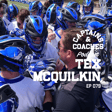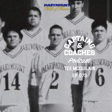
071 - The Ball Busting Balance
In sports, laughter isn’t a distraction — it’s a bonding mechanism. In this episode of Captains & Coaches, Tex McQuilkin dives into the art and science of banter — the playful trash talk, inside jokes, and honest jabs that transform teammates into brothers and sisters in arms.
Tex explores how banter becomes the most fun way to deliver candor. Listeners will learn why the best teams master the ball busting balance: pairing humor with humility, honesty with celebration, and competition with connection.
From locker-room roasts that build trust to coaching strategies that use humor to break tension, this episode shows how great leaders use laughter to strengthen culture, emotional armor, and resilience. Because when a team can joke, they can trust — and when they can trust, they can win.
Key Takeaways:
- Why humor and honesty are essential ingredients in high-performing teams
- How to balance banter with celebration to avoid cynicism
- Tools for coaches to use humor to ease tension and build connection
- Ways to test composure and mental toughness through playful trash talk
Laugh as a team, grow as a team.
Training - Old Bull Program - 7 Day Free Trial - https://bit.ly/old-bull-train
Education - Why They're Not Listening: Coaching the Modern Athlete - http://listen.captainsandcoaches.com



















